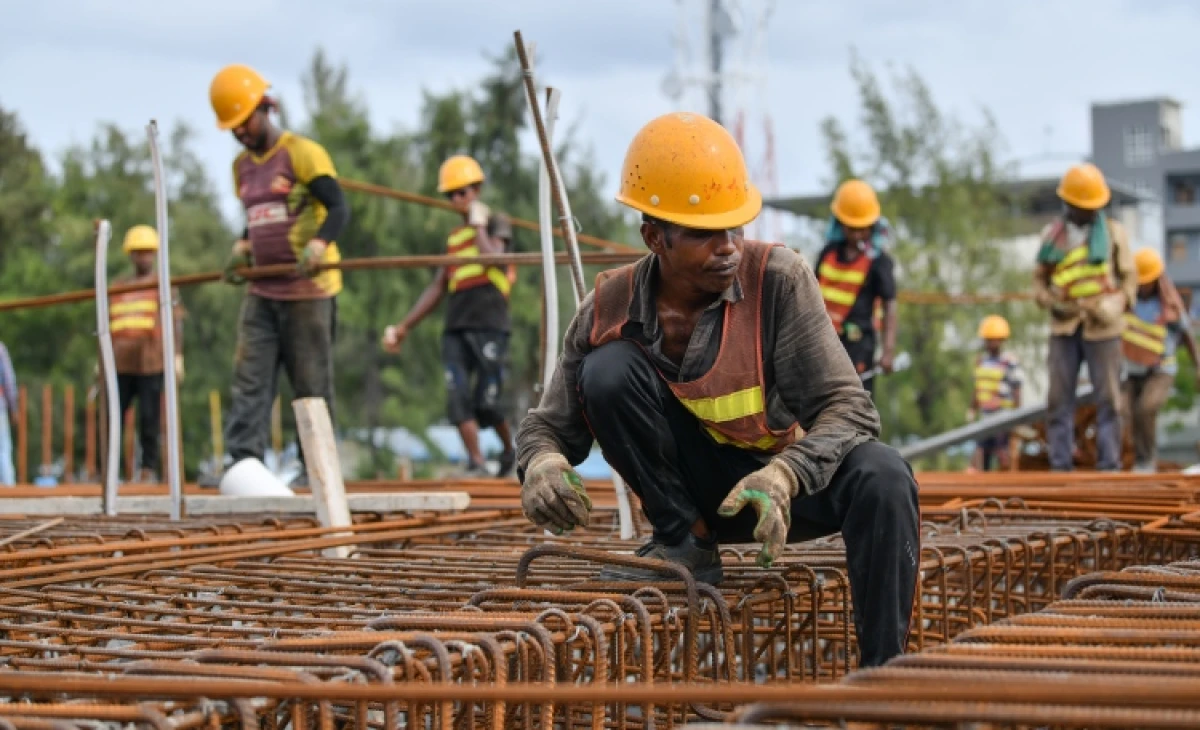Wed, 17 Dec 2025
|DHIVEHI
Maldives moves to resolve decades-old expatriate labour challenges
13 Sep 2025
|

Expatriate workers in construction-- Photo: Maldives Business Times
The Maldives has long struggled with the rising number of expatriate workers, including undocumented migrants, and the neglect of their basic rights. Weak enforcement and the absence of reliable data left successive governments unable to put forward lasting solutions.
Employers and recruiters who brought in foreign labour without proper oversight further heightened the problem, while a culture of limited accountability allowed undocumented workers to remain in the country. Over time, these gaps created systemic challenges that weighed on both the economy and social stability.
When President Dr Mohamed Muizzu assumed office, he pledged to confront the issue with structured policies set out in his manifesto and reinforced by a clear plan of implementation. Since then, the Administration has rolled out large-scale measures to improve accountability, strengthen data collection, and step up enforcement, efforts that are now beginning to show tangible results.
Operation Kurangi: Building a National Expatriate Database
A central achievement of the Administration has been the launch of Operation Kurangi, spearheaded by the Ministry of Homeland Security and Technology. The three-phase initiative is the first of its kind in the Maldives, aimed at building a comprehensive record of expatriate workers and giving policymakers accurate data at both atoll and island levels.
In its first phase, the Ministry has already completed nationwide biometric registration. A total of 177,272 expatriates have been recorded to date, while island councils have been equipped with the tools and resources to continue the process locally, ensuring that no community is left out.
At the same time, the Government has identified 4,101 employers who have not yet completed the registration of their employees. Work is ongoing to bring these employers into compliance. Once the process is finalised, the database will provide a detailed breakdown of expatriate populations across the country, enabling the State to design targeted policies, monitor undocumented workers, and enforce immigration rules more effectively.
Officials describe the initiative as a turning point, one that shifts national policy from reactive enforcement to proactive, data-driven management of expatriate labour.
Protecting Workers Through Employer Accountability
For years, a lack of employer accountability left expatriate workers vulnerable, with unpaid fees and neglected obligations exposing them to uncertainty in a system that struggled to protect their rights. Since taking office, the current Administration has made employer responsibility a priority, collecting MVR 2.1 billion in expatriate-related fees and fines between 17 November 2023 and 10 September 2025 — a significant increase compared to previous years.
Breakdown of collections:
- Work permit fees: MVR 1.2 billion
- Quota fees: MVR 8.2 million
- Fines: MVR 6.7 million
- Service fees: MVR 2 million
In total, a little MVR 2.1 billion has been collected so far, a 35 per cent more than the MVR 1.4 billion collected in the previous five years.
Yet, MVR 974 million in fees and fines remains unpaid. To recover the outstanding amount, settlement agreements have been signed with 7,907 individuals, giving them one year to make payments. Those who fail to comply have had their access to the Xpat portal suspended until an agreement is reached.
Observers note that this is not only a matter of revenue. Unpaid fees often leave expatriate workers caught in uncertainty, as the lack of compliance by employers undermines their legal status and exposes them to further vulnerability. Enforcing these payments is seen as a step toward ensuring that employers meet their obligations, a shift aimed at safeguarding workers’ rights while creating a culture of accountability in the labour system.
Stronger Enforcement on Undocumented Migration
Enforcement has also intensified in recent months, with more expatriates deported in the first 18 months of this Administration than in the previous one.
Between November 2023 and April 2025, a total of 2,446 expatriates were deported, including:
- 908 linked to criminal offences
- 43 for illegal entry
- 1,495 for visa violations
By comparison, 2,165 expatriates were deported between 2019 and November 2023. The sharp increase reflects a stronger push to address undocumented migration and labour law violations.
Those deported include individuals living in the country without valid documents, workers employed without permits, and those who left their original sponsors. For many, these situations stem from broken contracts or employers who failed to renew work permits, circumstances that often place workers at risk through no fault of their own.
While the Government frames decisive action as vital to maintaining order and national security, rights advocates stress that enforcement must also safeguard the dignity of workers, ensuring they are not further victimised by employer negligence or systemic gaps.
Building Stability and Safeguards for Expatriate Workers
The Administration’s efforts point to a broader determination to resolve an issue that has shaped the country’s labour market for decades. By combining reliable data, employer accountability, and tighter enforcement, officials present the current approach as a turning point in the way expatriate labour is managed in the Maldives.
Minister of Homeland Security and Technology Ali Ihusaan has repeatedly underlined that by the end of the Government’s term, systematic frameworks will be in place to secure long-term stability and internal security. Current figures, he said, already show progress consistent with that goal.
The results to date suggest that the Maldives is moving closer to establishing comprehensive, enforceable policies to manage expatriate labour — an area where successive administrations have struggled. For many expatriate workers, this could mean a future with clearer protections, fairer oversight, and fewer vulnerabilities created by employer negligence or systemic gaps.


Popular News







